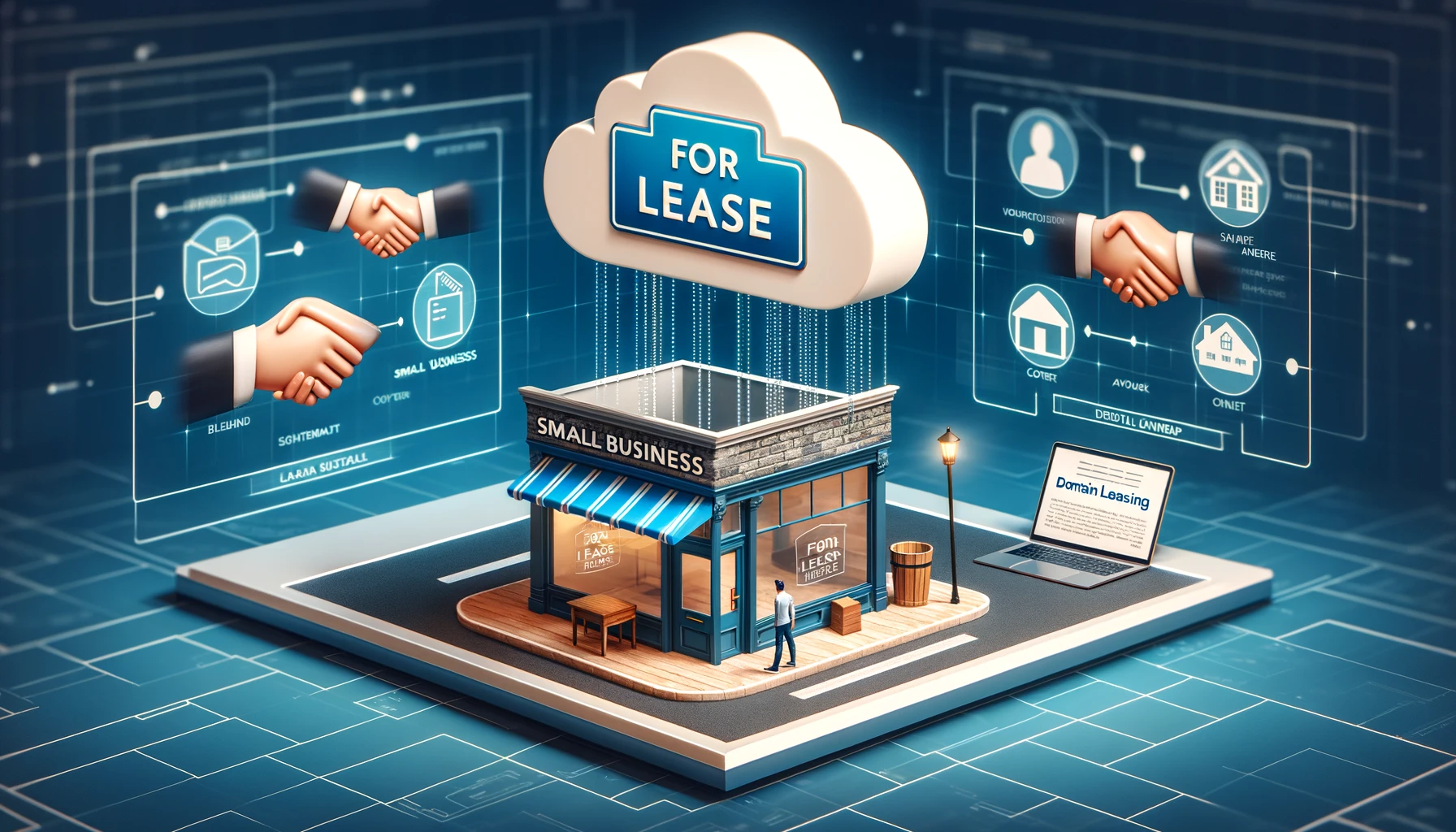Imagine stepping into a market where the right words can unlock doors to digital kingdoms. That’s what navigating domain leasing feels like.
Negotiating a domain lease is akin to performing a carefully choreographed ballet, requiring a blend of tactical maneuvering and visionary planning.
This handbook aims to guide you through securing top-tier domains affordably, ensuring your digital footprint remains strong without draining your wallet.
Exploring the realm of domain leasing unfolds as a savvy maneuver for experienced and budding proprietors aiming to capitalize on their digital estates without outright ownership.
We’re also diving deep into acquiring leased domains, critical considerations in lease agreements, and protecting your interests throughout the transaction.
Embarking on this adventure, you’ll gain the toolkit needed to craft advantageous deals and navigate through legal snares easily. So buckle up; it’s time to explore uncharted territories in domain leasing.
Table Of Contents:
- Understanding Domain Leasing and Its Benefits
- The Process of Acquiring a Leased Domain
- Key Considerations in Domain Lease Agreements
- Advantages of Domain Leasing for End Users
- Challenges and Downsides of Leasing Domains
- Essential Steps in Negotiating Your Perfect Domain Lease
- Utilizing Professional Assistance in Domain Transactions
- Protecting Your Interests in a Domain Lease Transaction
- Exploring Options for Where To Lease A Domain
- Comparing Leasing vs. Buying Domains Directly
- Conclusion
Understanding Domain Leasing and Its Benefits
What Is Domain Leasing?
Domain leasing is like renting an apartment, but you get a premium online address instead of a place to live. Through this setup, companies can harness the power of sought-after web addresses without bearing the substantial initial investment needed to own them completely.
Securing a leased domain can significantly elevate your digital footprint, akin to snagging prime real estate in the virtual world. It endows your digital identity with the prestige and distinctiveness associated with top-tier web real estate. Think of it as setting up shop in a prime location rather than being tucked away in an obscure alley.
Benefits Of Leasing For Domain Owners
If you own a premium domain name, leasing it out can be pretty lucrative. It’s essentially earning passive income from digital real estate you’re not using. Retaining ownership means you can sell the domain later or develop it yourself when ready.
Provides Another Way To Monetize A Domain
Beyond selling or developing their domains, owners have a unique avenue to make money through leasing. You lock in ongoing revenue while waiting for appreciation or finding the right buyer—quite brilliant if you ask me.
The Process of Acquiring a Leased Domain
Researching the Desired Domain Name
Finding the right domain name is like hunting for treasure in the digital world. It starts with brainstorming names that align with your brand’s essence. Use tools like NameCheap or Google Domains to check availability and get ideas.
If your dream domain is taken, don’t fret. Many owners list their domains on marketplaces such as Sedo, where you can see if it’s up for lease.
Initiating Contact with the Owner
Contacting a domain owner directly can be tricky, but it’s doable. Tools like WHOIS lookup provide contact details unless privacy settings hide them. In such cases, consider using a broker to make this step smoother.
A polite and concise email explaining your interests and intentions goes a long way. Remember, you’re starting a negotiation process; first impressions matter.
Negotiating Lease Terms
Striking the right balance between firmness and adaptability is critical in negotiations. Begin by proposing fair terms, but be ready to compromise.
Involving legal help ensures that agreements protect both parties’ interests adequately — especially concerning early termination policies or potential purchase options down the line.
Key Considerations in Domain Lease Agreements
Understanding Commercial Lease Agreements
Navigating the waters of domain leasing isn’t just about finding a premium name; it’s also about understanding what you’re signing up for. A commercial lease agreement outlines the terms under which you can use the domain, including duration and payment schedules. Think of it as renting an office space but for your digital storefront.
This pact is vital as it lays down the rules for your engagement with the asset you’re renting. It ensures that both parties—the leaser and the lessee—have their expectations aligned from day one. To familiarize oneself with standard practices, checking out resources like ICANN’s policies on domain leasing might help.
Negotiating a Lower Price and Terms
Bargaining isn’t just for flea markets; it’s also alive and well in the digital realm. When negotiating a domain lease, remember that everything from price to early termination clauses can often be tailored to better suit your needs or budget constraints.
To ace this process, start by researching comparable domains to understand market rates—a tool like NameBio could be handy here. Armed with data, approach negotiations confidently but remain open to compromise. Remember, being adaptable during discussions can foster agreements that satisfy both sides, ensuring no one feels they’ve gotten the short end of the stick.
Advantages of Domain Leasing for End Users
Reduced Initial Investment, Pathway to Ownership
Spend less money upfront—that’s the immediate perk of domain leasing. Instead of shelling out thousands for a premium domain name, you pay in manageable installments. This makes digital real estate accessible even if your budget is more studio apartment than a sprawling mansion.
Securing the option to purchase the domain later introduces an enticing dimension akin to having a layaway plan for the digital territory. Think about it as renting to own a house. You live there, make it yours, and you can own it outright when you’re ready—and financially able.
Access to premium domain names at a lower cost isn’t just about saving bucks. It’s like having VIP access immediately without paying the total price tag. You get all the benefits—increased credibility, better brand recognition, and potentially higher traffic—all while keeping your wallet happy.
Challenges and Downsides of Leasing Domains
Building Value on Borrowed Digital Real Estate
The biggest kicker about leasing a domain is that all the value you build, from brand recognition to SEO rankings, isn’t yours. Imagine pouring your heart into building a stunning sandcastle, only for the tide (or, in this case, the domain owner) to wash it away. This can be especially painful if your leased domain becomes synonymous with your business identity.
Beyond not owning the equity you create, there’s also less stability with leased domains. At any point, lease terms could change, or renewals might not be offered, leaving businesses scrambling. Think of it as renting an apartment where you’ve painted every wall just so, then one day being told you have to move out and leave all those perfect colors behind.
To cap it off, negotiating lease agreements requires finesse and often legal insight because they’re far more complex than outright purchases. The terms can include limitations that hinder how you use the domain—like strict content guidelines or prohibitions against certain types of monetization—which might clip your wings just when you thought it was time to fly.
Essential Steps in Negotiating Your Perfect Domain Lease
Establishing Clear Objectives for the Lease Agreement
Nailing down your goals before you start negotiations on your perfect domain is like packing a map for a road trip. Understanding your destination is essential before embarking on the journey. Are you looking for short-term branding or do you see this domain playing a crucial role in your business years down the line? This clarity will shape how hard you push and what terms are non-negotiable.
Beyond getting the domain, consider specifics like lease duration, renewal options, and price escalations. Securing a spot in the digital landscape involves more than just claiming it; it necessitates ensuring its alignment with your business framework to avoid potential pitfalls down the road.
Mastering negotiation’s subtleties entails the flexibility to adapt as circumstances require. Being willing to compromise doesn’t mean losing—it means strategizing for mutual benefit. Maybe there’s wiggle room on pricing if you agree to longer terms or upfront payment. Here’s where staying calm and professional pays off because heated discussions won’t get anyone closer to signing that dotted line.
Utilizing Professional Assistance in Domain Transactions
When and Why to Engage a Broker
Navigating the world of domain leasing can feel like trying to find your way through a maze. That’s where hiring a domain broker comes into play. Experts in their field, these specialists possess an intricate understanding that proves indispensable.
A broker brings more than just expertise; they have connections you likely don’t. This network can open doors to premium domains that aren’t listed yet. Imagine getting first dibs because your broker knows who to call.
Let’s talk negotiations—they’re an art form. Brokers are seasoned negotiators trained to get you the best deal possible. They’re not just winging it; their strategies are backed by years of experience and data on market trends.
The benefits of hiring a domain broker for negotiations don’t stop there: peace of mind is vast. Sedo’s brokerage service, for example, ensures everything from negotiation to transfer is handled professionally.
Hiring one might seem like an extra cost upfront, but think about this: they could save you thousands by avoiding pitfalls or securing better terms than you’d manage alone. Put another way, paying for specialized assistance today might translate into considerable financial benefits in the future.
Protecting Your Interests in a Domain Lease Transaction
Legal Considerations in Domain Leasing
Navigating the legal landscape of domain leasing can feel like trying to solve a Rubik’s Cube blindfolded. But it doesn’t have to be that way. Knowing what pitfalls to avoid upfront can save you from headaches later on.
First, ensure your lease agreement clearly outlines who is liable for content and actions taken on the domain during the lease period. This is crucial because if something goes wrong, you don’t want to be caught off guard by legal battles or fines.
Grasping the nuances of how trademarks intertwine with domain names marks another critical phase in safeguarding your digital terrain. Just because you lease a domain doesn’t mean you’re free from trademark infringement risks. It’s wise practice to thoroughly check for potential conflicts before signing anything—this helps avoid legal liability issues.
Last, consider including an early termination clause in your contract. Life happens—maybe the project takes another direction, or perhaps financial situations change—but the point is that having an exit strategy ensures flexibility without being penalized heavily.
Exploring Options for Where To Lease A Domain
Choosing the Right Platform or Service
Finding where to lease a domain can feel like looking for a needle in a digital haystack. But it doesn’t have to be that way. Think of domain marketplaces as your online treasure maps, leading you to the perfect spot.
The first stop on this map is often dedicated domain leasing platforms. These platforms are meticulously crafted to bridge the gap between domain holders and those seeking to lease them. They offer various domains and sometimes provide tools to help negotiate terms directly on the platform.
Exploring broker services as an alternative can also help secure those sought-after web addresses. Brokers act as middlemen who find premium domains for you and negotiate terms on your behalf. Though they charge a commission, their adeptness at clinching advantageous agreements often justifies the expenditure.
Brokers also understand that whois information can be crucial for managing domain ownership. When registering a domain, your details, such as name, address, and contact information, are typically recorded in the Whois database.
However, domain privacy can shield this information from public view, safeguarding your privacy and reducing the risk of unwanted solicitations or potential security threats.
With domain privacy enabled, your contact details are replaced with those of a privacy service provider, ensuring that your personal information remains confidential while allowing legitimate parties to contact you anonymously.
This feature is precious for individuals and businesses concerned about online privacy and security. You can confidently manage your domain without compromising your privacy by maintaining control over who can access your contact information.
Last but certainly not least, consider exploring forums and networking groups related to domains and hosting. Here, you might stumble upon unique leasing opportunities not listed elsewhere.
Comparing Leasing vs. Buying Domains Directly
Evaluating Long-Term Impacts on Business Strategy
Deciding between leasing and buying a domain is like renting or owning a house but with digital real estate. Each path offers unique advantages, hinging on your company’s aspirations and economic adaptability.
When you lease a domain, you’re essentially renting it for a set period.
This option offers fledgling enterprises the opportunity to carve out their digital footprint, sparing them the steep initial investment often associated with acquiring top-tier web properties outright.
This approach allows companies to employ premium web domains while allocating their financial resources towards various business necessities.
On the flip side, buying a domain directly gives you complete control over this internet real estate indefinitely (as long as renewal fees are paid). It’s similar to putting money into a piece of land that might grow in worth as the years pass.
Owning your domain means you won’t have to worry about lease expiration or terms changing; it permanently secures your brand’s home online. Moreover, holding the reins of your domain can boost your business’s reputation, showing steadfast dedication and reliability to both guests and patrons.
Conclusion
Navigating the dance of negotiating domain lease terms isn’t just brilliant; it’s strategic. You’ve learned that leasing offers access to premium domains without the hefty upfront cost.
Remember, success in this arena comes from understanding your needs and finding common ground with domain owners. Securing a lease agreement on favorable terms often hinges on the willingness to wait it out.
Keep legal considerations at the forefront to protect your interests. And don’t forget, professional help can make all the difference in sealing the deal on your perfect domain.
Embarking on this voyage of domain leasing bestows upon your insights and tactics, fortifying your digital footprint. So leverage what you’ve learned and unlock new digital doors for your business.





